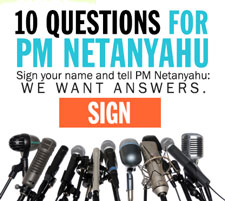Now that the fighting between Israel and Hamas seems to be finally and thankfully over, it is appropriate to ask what either side got out of it.
Hamas, as an authoritarian organization that does not permit free, political life in the territory it controls, may attempt to evade accountibility for a while. Of course, we have some tough questions for Hamas too.
But in the spirit of Israeli democracy, Prime Minister Netanyahu owes Israelis a full accounting of the government’s actions and decisions over the past two months.
Here are some questions he and his cabinet are already being asked, or may be in the days and weeks ahead:
Let Prime Minister Netanyahu know that it’s time for answers. Sign now.
- What were Israel’s war aims in Gaza and to what extent were they achieved? Yes, Israel inflicted heavy losses and tremendous destruction in Gaza. It destroyed over 30 tunnels and assassinated some Hamas military leaders. But it also lost over 60 Israelis and discovered that the price of a full-scale invasion of Gaza was unacceptable. What has really been achieved? Was there an expectation of a different outcome?
- Did this operation make Israel more secure? Did it lower the risks Israelis face going forward and specifically did it make the residents of southern Israel safer?
- Did the operation serve to weaken or strengthen Hamas, which was almost completely isolated in the Arab world, financially bankrupt and at a historic low point before the war began?
- Has the war in any way changed the strategic balance in Gaza – or was it another case of “mowing the lawn” – inflicting damage on Hamas in exchange for a few months or years of quiet?
- Does the government finally realize that the blockade of Gaza leaves its residents with no hope and no future and breeds hatred of Israel? Is the government prepared to substantially loosen the blockade? Is Israel willing to allow a massive program of economic development to unfold in Gaza including the construction of an airport and sea port that could really change the situation there, or does it intend to allow some token moves and then get back to “business as usual?”
- Does the prime minister finally grasp that in President Abbas, he has a partner committed to non-violence who presents an alternative to Hamas and is willing to make peace with Israel?
- Israel welcomed and agreed to the stationing of Palestinian security forces on the Rafah border between Gaza and Egypt. Yet it apparently does not trust those same forces, backed by a multilateral international contingent and the most sophisticated technologies the world has to offer, to police the borders of a future Palestinian state. Why not?
- Were all of the tactics and weapons used by Israel during the war justifiable under the doctrine of proportionate use of force? What about the use of relatively inaccurate artillery and tank fire in densely-populated areas? Will the government launch a credible, independent, judicially-led inquiry into the conduct of the war, both by the government and by the IDF?
- In a speech in Tel Aviv on July 8, Philip Gordon, the White House Coordinator for the Middle East, North Africa, and the Gulf Region, posed the following critical questions that go to the heart of Israel’s future: “How will Israel remain democratic and Jewish if it attempts to govern the millions of Palestinian Arabs who live in the West Bank? How will it have peace if it is unwilling to delineate a border, end the occupations and allow for Palestinian sovereignty, security, and dignity? How will we prevent other states from isolating Israel or supporting Palestinian efforts in international bodies if Israel is not seen as committed to peace? “
- Is the Israeli government willing and/or able to seize the opportunity that has arisen from this war and the sacrifices made by Israelis, to forge a full-scale diplomatic initiative that could tackle the root causes of the conflict and transform the region?
Sign your name and say: Now that the war is over, Mr. Netanyahu, it’s time for some answers.
